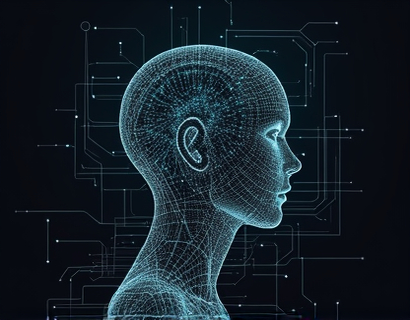AI-Powered Imaginative Companions: Transforming Childhood Creativity and Emotional Well-Being
The integration of artificial intelligence in childhood development is opening new horizons for enhancing creativity and emotional well-being in young minds. AI-powered imaginative companions represent a groundbreaking approach, blending technology with the essential elements of play and emotional growth. These digital entities are designed to interact with children in personalized ways, offering a safe and imaginative play environment that supports both creative and emotional development.
Understanding the Role of Imaginative Play in Childhood
Imaginative play is a cornerstone of childhood development. It allows children to explore their creativity, develop problem-solving skills, and understand complex emotions. Through play, children learn to navigate social situations, express themselves, and develop a sense of identity. However, modern challenges such as screen time concerns and the need for personalized learning experiences have prompted a reevaluation of traditional play methods. AI-powered companions offer a innovative solution, providing a tailored and safe space for children to engage in imaginative activities.
How AI-Powered Companions Enhance Creativity
AI-powered imaginative companions are equipped with advanced algorithms that enable them to understand and respond to a child's creative inputs. These companions can generate stories, create art, and engage in role-play scenarios, all tailored to the child's interests and imagination. By interacting with these digital entities, children are encouraged to think outside the box, explore new ideas, and express their creativity in diverse ways. The AI's ability to adapt and evolve based on the child's interactions ensures that the play experience remains fresh and stimulating.
Personalized Interactions for Individual Creativity
One of the key strengths of AI-powered companions is their ability to provide personalized interactions. Each child is unique, with different interests, strengths, and areas for growth. AI algorithms analyze the child's preferences and behaviors to tailor the interactions accordingly. For instance, a child who loves dinosaurs might find the companion generating stories about prehistoric adventures or creating dinosaur-themed art. This level of personalization not only keeps the child engaged but also fosters a deeper sense of creativity and self-expression.
Promoting Emotional Well-Being
Emotional well-being is as crucial as cognitive development in childhood. AI-powered imaginative companions play a significant role in supporting emotional growth by providing a safe and non-judgmental space for children to explore their feelings. These companions can recognize and respond to a child's emotional cues, offering comfort, encouragement, and guidance. Through these interactions, children learn to identify and manage their emotions, build resilience, and develop empathy.
Emotional Support and Validation
Children often struggle to articulate their emotions, and traditional play methods may not always address emotional needs effectively. AI companions can bridge this gap by offering emotional support and validation. For example, if a child is feeling sad or anxious, the companion can initiate a conversation, share relatable stories, or suggest calming activities. This supportive environment helps children feel understood and valued, fostering a positive emotional outlook.
Social Skills Development
Social skills are fundamental to a child's success in both personal and professional life. AI-powered imaginative companions can facilitate social skills development through interactive scenarios that mimic real-life social interactions. These companions can engage in role-play games, teach turn-taking, and model appropriate social behaviors. By practicing these skills in a controlled and safe environment, children can build confidence and improve their ability to interact with peers.
Building Empathy and Understanding
Empathy is a critical component of social development. AI companions can help children develop empathy by presenting scenarios that require understanding and responding to the emotions of others. For instance, the companion might present a story where a character is feeling lonely and ask the child to suggest ways to help. This interactive approach not only teaches empathy but also reinforces the importance of kindness and compassion.
Creating a Safe Play Environment
Safety is a paramount concern for parents and guardians when it comes to children's digital experiences. AI-powered imaginative companions are designed with safety in mind, providing a controlled and monitored environment for play. These companions operate within predefined parameters, ensuring that interactions are appropriate and beneficial. Parents can rest assured that their children are engaging in positive and constructive activities without the risks associated with unsupervised screen time.
Parental Controls and Monitoring
To further enhance safety, AI companions offer robust parental controls and monitoring features. Parents can set boundaries, monitor interaction logs, and adjust the level of complexity based on the child's age and developmental stage. This level of control allows parents to tailor the experience to their child's needs while maintaining oversight. The transparency and flexibility of these features help build trust between parents and the technology.
Fostering Imaginative Play
Imaginative play is a vital aspect of childhood development, and AI-powered companions excel in fostering this type of play. By providing a versatile and responsive play partner, these companions encourage children to explore their imagination and creativity. The AI's ability to generate unique scenarios and respond to creative inputs ensures that play remains dynamic and engaging.
Encouraging Open-Ended Play
Open-ended play allows children to create their own rules and narratives, promoting independence and critical thinking. AI companions support this type of play by offering endless possibilities and avoiding prescriptive guidelines. For example, a child can create a story with the companion, and the AI will adapt to the child's narrative, introducing new elements and challenges. This collaborative approach nurtures a sense of ownership and creativity, as children feel free to shape their own play experiences.
Integrating Technology with Traditional Play
While technology plays a significant role in modern childhood, it is essential to balance digital interactions with traditional play methods. AI-powered imaginative companions can complement traditional play by enhancing and expanding the play experience. For instance, a child playing with physical toys can use the companion to bring those toys to life through storytelling or interactive scenarios. This integration ensures that children benefit from the best of both worlds, combining the tactile joy of physical play with the innovative possibilities of digital interaction.
Supporting Cognitive Development
Beyond creativity and emotional well-being, AI-powered imaginative companions contribute to cognitive development. These companions engage children in activities that challenge their thinking, problem-solving, and memory skills. Through interactive games, puzzles, and storytelling, children can improve their cognitive functions in a fun and engaging way.
Enhancing Problem-Solving Skills
Problem-solving is a critical cognitive skill that serves children well throughout their lives. AI companions can present challenges and puzzles that require logical thinking and creative solutions. For example, the companion might create a scenario where a character is lost in a forest and needs to find their way back home. The child can guide the character by making decisions based on the environment and available resources, thereby enhancing their problem-solving abilities.
Boosting Memory and Attention
Interacting with AI companions can also help improve memory and attention span. The companions often involve multi-step tasks and narratives that require children to remember details and follow through on actions. This type of engagement helps strengthen memory functions and improves attention to detail, which are valuable skills in both academic and personal contexts.
Building Confidence and Self-Esteem
Confidence and self-esteem are essential for a child's overall development and future success. AI-powered imaginative companions play a role in building these qualities by providing a supportive and encouraging environment. Through positive reinforcement and successful interactions, children can develop a sense of achievement and self-worth.
Positive Reinforcement
AI companions are designed to offer positive reinforcement, acknowledging and celebrating the child's efforts and accomplishments. Whether it's completing a creative task or solving a problem, the companion provides encouragement and praise, boosting the child's confidence. This positive feedback loop helps children feel valued and motivated to continue exploring and learning.
Overcoming Challenges
Facing and overcoming challenges is a key aspect of personal growth. AI companions can introduce age-appropriate challenges that push children to step out of their comfort zones. By guiding children through these challenges and celebrating their successes, the companions help build resilience and a growth mindset. This approach not only enhances self-esteem but also prepares children to tackle future obstacles with confidence.
Conclusion
AI-powered imaginative companions represent a revolutionary approach to childhood development, combining the benefits of technology with the essential elements of play and emotional growth. These digital entities offer personalized, safe, and imaginative play experiences that support creativity, emotional well-being, social skills, cognitive development, and self-esteem. As this technology continues to evolve, it holds the potential to transform the way we support and nurture young minds, ensuring they grow into confident, creative, and emotionally resilient individuals.











































